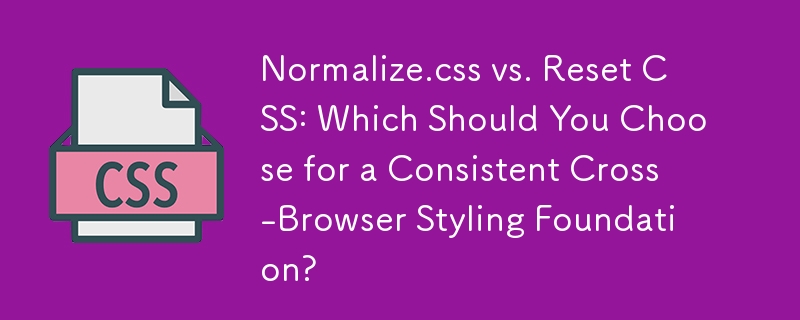 Web Front-end
Web Front-end
 CSS Tutorial
CSS Tutorial
 Normalize.css vs. Reset CSS: Which Should You Choose for a Consistent Cross-Browser Styling Foundation?
Normalize.css vs. Reset CSS: Which Should You Choose for a Consistent Cross-Browser Styling Foundation?
Normalize.css vs. Reset CSS: Which Should You Choose for a Consistent Cross-Browser Styling Foundation?

Beyond Reset CSS: Uncovering the Nuances of Normalize.css
As a seasoned CSS developer, you're familiar with the power of CSS Reset to eliminate browser defaults and create a blank canvas for your designs. However, a new contender has emerged in the form of Normalize.css, prompting many to question its distinctiveness.
Clearing the Haze: Normalize.css vs. Reset CSS
At its core, Normalize.css shares a similar goal with Reset CSS: to establish a consistent starting point for styling. However, they diverge in several crucial ways:
- Preserving Defaults: While Reset CSS "unstyles" elements, Normalize.css opts for a more nuanced approach. It retains useful default styling, such as the distinct appearance of sup and sub elements, unlike Reset CSS, which removes these differences. This approach provides a less-opinionated foundation that allows natural text elements to function as expected without additional overrides.
- Countering Quirks: Normalize.css goes beyond the scope of Reset CSS by tackling specific browser bugs. It rectifies issues such as display inconsistencies for HTML5 elements, absent font inheritance for form controls, and iOS button styling errors.
- Decluttering Development Tools: Reset CSS often creates a lengthy inheritance chain, cluttering CSS debugging tools. Normalize.css, on the other hand, employs targeted stylings, resulting in a more organized and manageable codebase.
- Modular Approach: Normalize.css is highly modular, allowing developers to selectively disable sections if they're confident those specific normalizations will not be required. This flexibility enhances the adaptability of the CSS.
- Robust Documentation: Normalize.css prioritizes thorough documentation, both inline and in its extensive GitHub Wiki. This transparency enables developers to comprehend each line of code, delve into browser differences, and contribute improvements.
Conclusion
Normalize.css is not merely a rebranding of CSS Reset, but a more comprehensive and refined tool for establishing a reliable cross-browser foundation. Its precision, extensibility, and documentation make it an indispensable asset for modern CSS workflows, complementing the proven reliability of CSS Reset with a new level of customization and insight.
The above is the detailed content of Normalize.css vs. Reset CSS: Which Should You Choose for a Consistent Cross-Browser Styling Foundation?. For more information, please follow other related articles on the PHP Chinese website!

Hot AI Tools

Undresser.AI Undress
AI-powered app for creating realistic nude photos

AI Clothes Remover
Online AI tool for removing clothes from photos.

Undress AI Tool
Undress images for free

Clothoff.io
AI clothes remover

Video Face Swap
Swap faces in any video effortlessly with our completely free AI face swap tool!

Hot Article

Hot Tools

Notepad++7.3.1
Easy-to-use and free code editor

SublimeText3 Chinese version
Chinese version, very easy to use

Zend Studio 13.0.1
Powerful PHP integrated development environment

Dreamweaver CS6
Visual web development tools

SublimeText3 Mac version
God-level code editing software (SublimeText3)

Hot Topics
 Vue 3
Apr 02, 2025 pm 06:32 PM
Vue 3
Apr 02, 2025 pm 06:32 PM
It's out! Congrats to the Vue team for getting it done, I know it was a massive effort and a long time coming. All new docs, as well.
 A bit on ci/cd
Apr 02, 2025 pm 06:21 PM
A bit on ci/cd
Apr 02, 2025 pm 06:21 PM
I'd say "website" fits better than "mobile app" but I like this framing from Max Lynch:
 Can you get valid CSS property values from the browser?
Apr 02, 2025 pm 06:17 PM
Can you get valid CSS property values from the browser?
Apr 02, 2025 pm 06:17 PM
I had someone write in with this very legit question. Lea just blogged about how you can get valid CSS properties themselves from the browser. That's like this.
 Using Markdown and Localization in the WordPress Block Editor
Apr 02, 2025 am 04:27 AM
Using Markdown and Localization in the WordPress Block Editor
Apr 02, 2025 am 04:27 AM
If we need to show documentation to the user directly in the WordPress editor, what is the best way to do it?
 Stacked Cards with Sticky Positioning and a Dash of Sass
Apr 03, 2025 am 10:30 AM
Stacked Cards with Sticky Positioning and a Dash of Sass
Apr 03, 2025 am 10:30 AM
The other day, I spotted this particularly lovely bit from Corey Ginnivan’s website where a collection of cards stack on top of one another as you scroll.
 Comparing Browsers for Responsive Design
Apr 02, 2025 pm 06:25 PM
Comparing Browsers for Responsive Design
Apr 02, 2025 pm 06:25 PM
There are a number of these desktop apps where the goal is showing your site at different dimensions all at the same time. So you can, for example, be writing
 How to Use CSS Grid for Sticky Headers and Footers
Apr 02, 2025 pm 06:29 PM
How to Use CSS Grid for Sticky Headers and Footers
Apr 02, 2025 pm 06:29 PM
CSS Grid is a collection of properties designed to make layout easier than it’s ever been. Like anything, there's a bit of a learning curve, but Grid is
 Google Fonts Variable Fonts
Apr 09, 2025 am 10:42 AM
Google Fonts Variable Fonts
Apr 09, 2025 am 10:42 AM
I see Google Fonts rolled out a new design (Tweet). Compared to the last big redesign, this feels much more iterative. I can barely tell the difference





